Annotated Bibliography: Cross-Cultural Training Program Effectiveness
VerifiedAdded on 2022/11/18
|8
|1941
|268
Annotated Bibliography
AI Summary
This annotated bibliography examines the effectiveness and implications of cross-cultural training programs in a global context. It analyzes five academic journal articles, focusing on topics such as the impact of social dominance orientation on cultural intelligence development, the influence of training timing on expatriate performance, and the role of cross-cultural training in preparing IT engineers for the global job market. The bibliography also explores the relationship between cultural intelligence, cultural divergence, and the performance of global team members. Each entry includes a summary of the article's content, research methods, key findings, and relevance to the broader topic, providing insights for managers and researchers interested in improving cross-cultural training strategies and enhancing global team performance. The articles highlight the importance of cultural intelligence, diversity management, and the development of effective training programs to navigate the complexities of international business and human resource management.
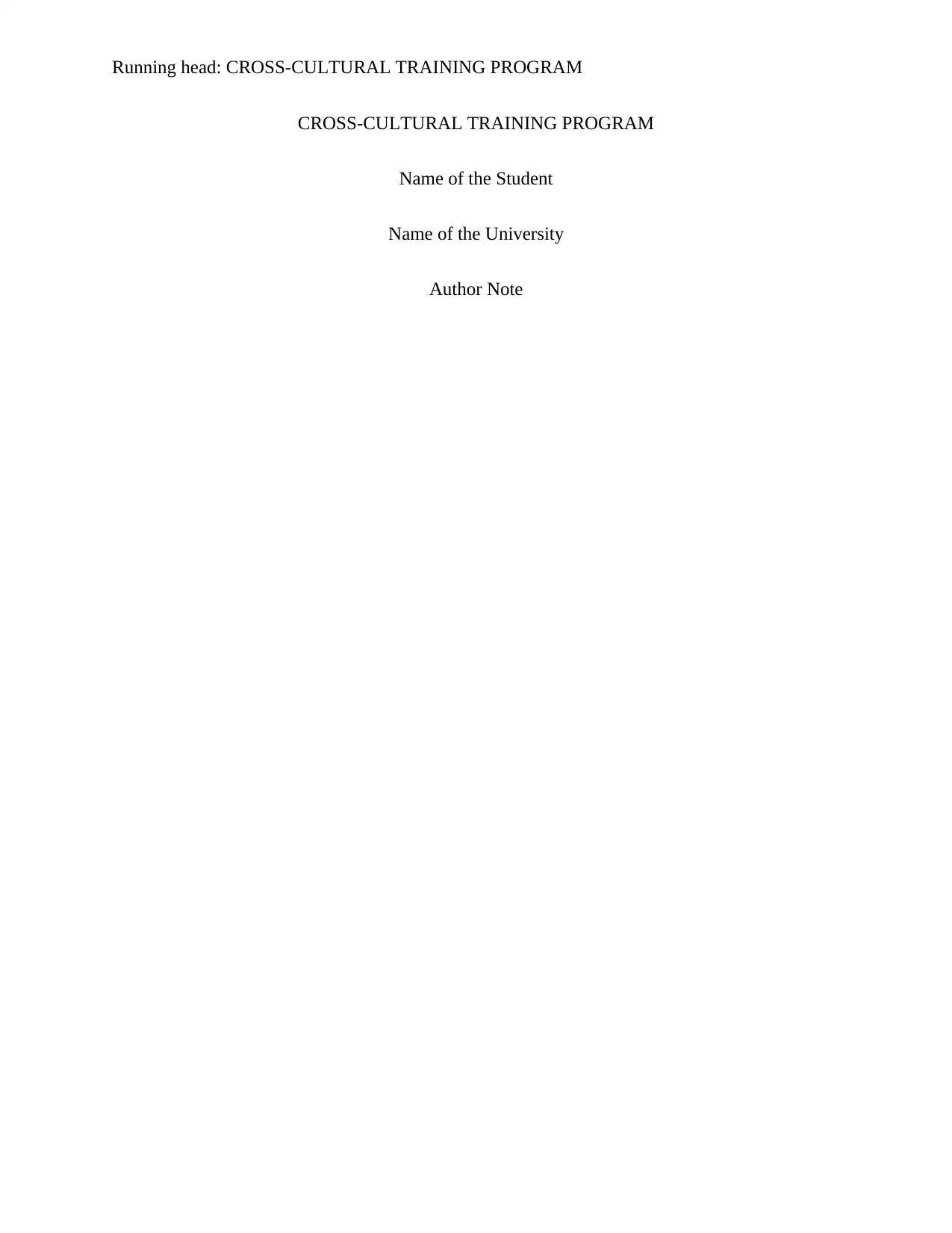
Running head: CROSS-CULTURAL TRAINING PROGRAM
CROSS-CULTURAL TRAINING PROGRAM
Name of the Student
Name of the University
Author Note
CROSS-CULTURAL TRAINING PROGRAM
Name of the Student
Name of the University
Author Note
Paraphrase This Document
Need a fresh take? Get an instant paraphrase of this document with our AI Paraphraser
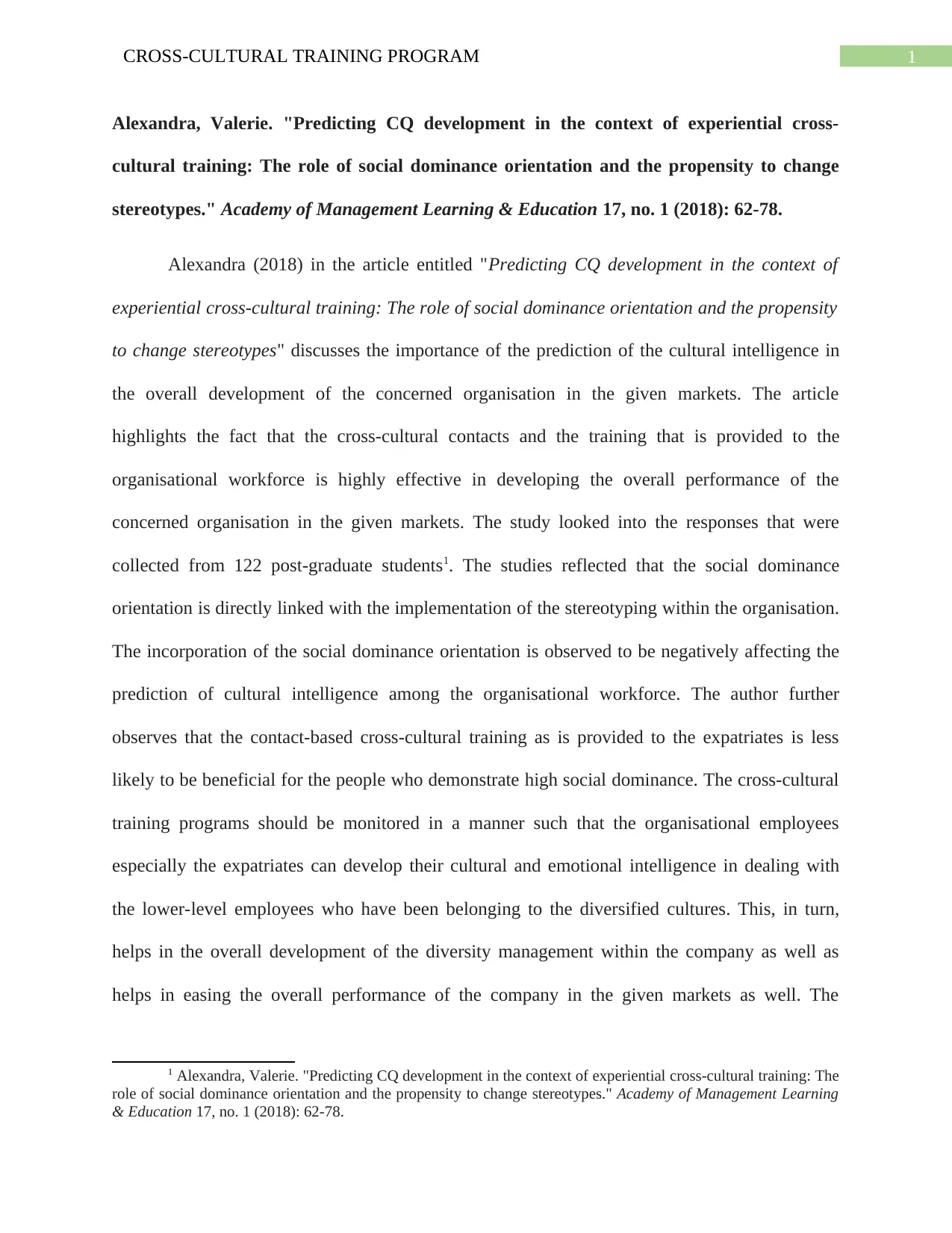
1CROSS-CULTURAL TRAINING PROGRAM
Alexandra, Valerie. "Predicting CQ development in the context of experiential cross-
cultural training: The role of social dominance orientation and the propensity to change
stereotypes." Academy of Management Learning & Education 17, no. 1 (2018): 62-78.
Alexandra (2018) in the article entitled "Predicting CQ development in the context of
experiential cross-cultural training: The role of social dominance orientation and the propensity
to change stereotypes" discusses the importance of the prediction of the cultural intelligence in
the overall development of the concerned organisation in the given markets. The article
highlights the fact that the cross-cultural contacts and the training that is provided to the
organisational workforce is highly effective in developing the overall performance of the
concerned organisation in the given markets. The study looked into the responses that were
collected from 122 post-graduate students1. The studies reflected that the social dominance
orientation is directly linked with the implementation of the stereotyping within the organisation.
The incorporation of the social dominance orientation is observed to be negatively affecting the
prediction of cultural intelligence among the organisational workforce. The author further
observes that the contact-based cross-cultural training as is provided to the expatriates is less
likely to be beneficial for the people who demonstrate high social dominance. The cross-cultural
training programs should be monitored in a manner such that the organisational employees
especially the expatriates can develop their cultural and emotional intelligence in dealing with
the lower-level employees who have been belonging to the diversified cultures. This, in turn,
helps in the overall development of the diversity management within the company as well as
helps in easing the overall performance of the company in the given markets as well. The
1 Alexandra, Valerie. "Predicting CQ development in the context of experiential cross-cultural training: The
role of social dominance orientation and the propensity to change stereotypes." Academy of Management Learning
& Education 17, no. 1 (2018): 62-78.
Alexandra, Valerie. "Predicting CQ development in the context of experiential cross-
cultural training: The role of social dominance orientation and the propensity to change
stereotypes." Academy of Management Learning & Education 17, no. 1 (2018): 62-78.
Alexandra (2018) in the article entitled "Predicting CQ development in the context of
experiential cross-cultural training: The role of social dominance orientation and the propensity
to change stereotypes" discusses the importance of the prediction of the cultural intelligence in
the overall development of the concerned organisation in the given markets. The article
highlights the fact that the cross-cultural contacts and the training that is provided to the
organisational workforce is highly effective in developing the overall performance of the
concerned organisation in the given markets. The study looked into the responses that were
collected from 122 post-graduate students1. The studies reflected that the social dominance
orientation is directly linked with the implementation of the stereotyping within the organisation.
The incorporation of the social dominance orientation is observed to be negatively affecting the
prediction of cultural intelligence among the organisational workforce. The author further
observes that the contact-based cross-cultural training as is provided to the expatriates is less
likely to be beneficial for the people who demonstrate high social dominance. The cross-cultural
training programs should be monitored in a manner such that the organisational employees
especially the expatriates can develop their cultural and emotional intelligence in dealing with
the lower-level employees who have been belonging to the diversified cultures. This, in turn,
helps in the overall development of the diversity management within the company as well as
helps in easing the overall performance of the company in the given markets as well. The
1 Alexandra, Valerie. "Predicting CQ development in the context of experiential cross-cultural training: The
role of social dominance orientation and the propensity to change stereotypes." Academy of Management Learning
& Education 17, no. 1 (2018): 62-78.
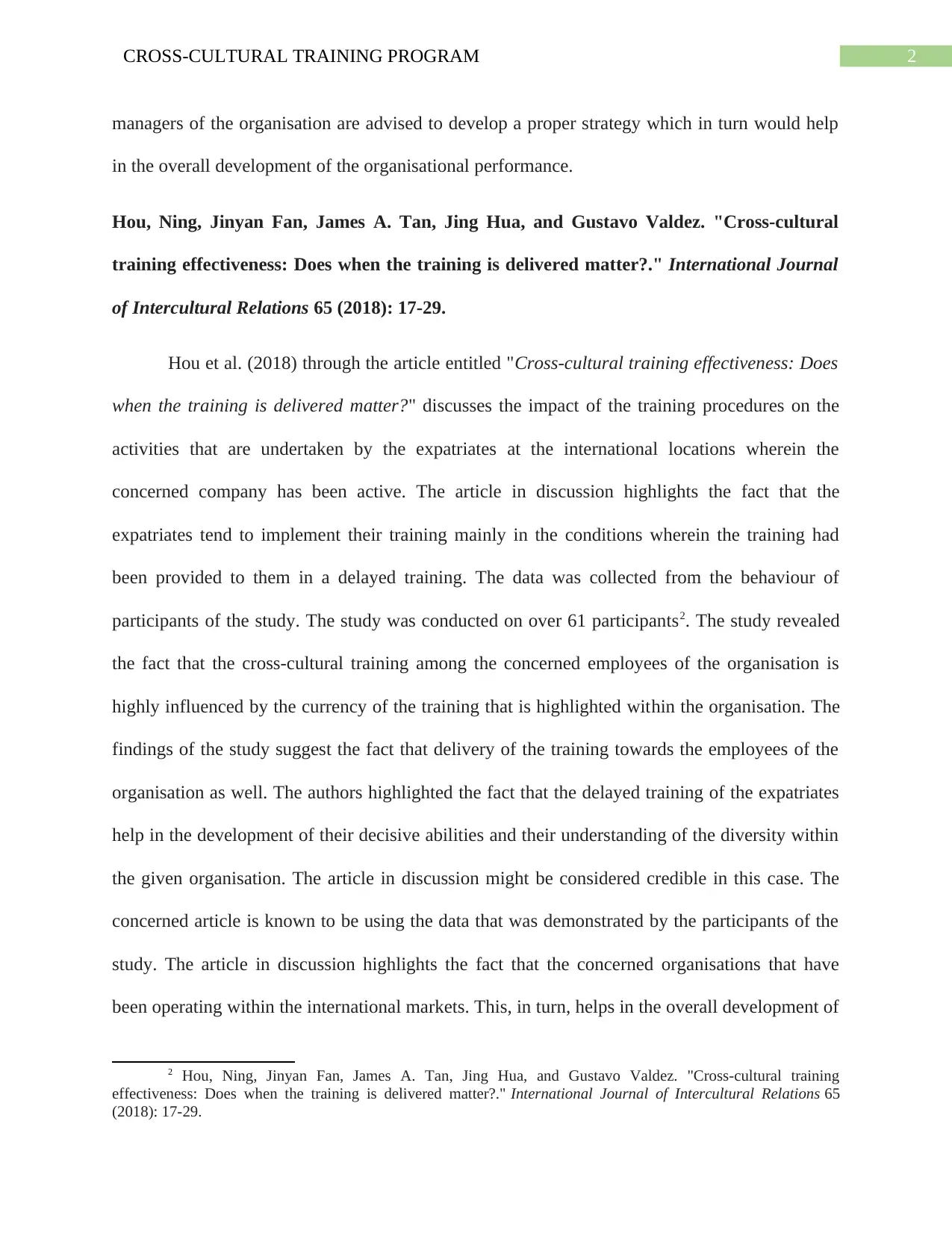
2CROSS-CULTURAL TRAINING PROGRAM
managers of the organisation are advised to develop a proper strategy which in turn would help
in the overall development of the organisational performance.
Hou, Ning, Jinyan Fan, James A. Tan, Jing Hua, and Gustavo Valdez. "Cross-cultural
training effectiveness: Does when the training is delivered matter?." International Journal
of Intercultural Relations 65 (2018): 17-29.
Hou et al. (2018) through the article entitled "Cross-cultural training effectiveness: Does
when the training is delivered matter?" discusses the impact of the training procedures on the
activities that are undertaken by the expatriates at the international locations wherein the
concerned company has been active. The article in discussion highlights the fact that the
expatriates tend to implement their training mainly in the conditions wherein the training had
been provided to them in a delayed training. The data was collected from the behaviour of
participants of the study. The study was conducted on over 61 participants2. The study revealed
the fact that the cross-cultural training among the concerned employees of the organisation is
highly influenced by the currency of the training that is highlighted within the organisation. The
findings of the study suggest the fact that delivery of the training towards the employees of the
organisation as well. The authors highlighted the fact that the delayed training of the expatriates
help in the development of their decisive abilities and their understanding of the diversity within
the given organisation. The article in discussion might be considered credible in this case. The
concerned article is known to be using the data that was demonstrated by the participants of the
study. The article in discussion highlights the fact that the concerned organisations that have
been operating within the international markets. This, in turn, helps in the overall development of
2 Hou, Ning, Jinyan Fan, James A. Tan, Jing Hua, and Gustavo Valdez. "Cross-cultural training
effectiveness: Does when the training is delivered matter?." International Journal of Intercultural Relations 65
(2018): 17-29.
managers of the organisation are advised to develop a proper strategy which in turn would help
in the overall development of the organisational performance.
Hou, Ning, Jinyan Fan, James A. Tan, Jing Hua, and Gustavo Valdez. "Cross-cultural
training effectiveness: Does when the training is delivered matter?." International Journal
of Intercultural Relations 65 (2018): 17-29.
Hou et al. (2018) through the article entitled "Cross-cultural training effectiveness: Does
when the training is delivered matter?" discusses the impact of the training procedures on the
activities that are undertaken by the expatriates at the international locations wherein the
concerned company has been active. The article in discussion highlights the fact that the
expatriates tend to implement their training mainly in the conditions wherein the training had
been provided to them in a delayed training. The data was collected from the behaviour of
participants of the study. The study was conducted on over 61 participants2. The study revealed
the fact that the cross-cultural training among the concerned employees of the organisation is
highly influenced by the currency of the training that is highlighted within the organisation. The
findings of the study suggest the fact that delivery of the training towards the employees of the
organisation as well. The authors highlighted the fact that the delayed training of the expatriates
help in the development of their decisive abilities and their understanding of the diversity within
the given organisation. The article in discussion might be considered credible in this case. The
concerned article is known to be using the data that was demonstrated by the participants of the
study. The article in discussion highlights the fact that the concerned organisations that have
been operating within the international markets. This, in turn, helps in the overall development of
2 Hou, Ning, Jinyan Fan, James A. Tan, Jing Hua, and Gustavo Valdez. "Cross-cultural training
effectiveness: Does when the training is delivered matter?." International Journal of Intercultural Relations 65
(2018): 17-29.
⊘ This is a preview!⊘
Do you want full access?
Subscribe today to unlock all pages.

Trusted by 1+ million students worldwide
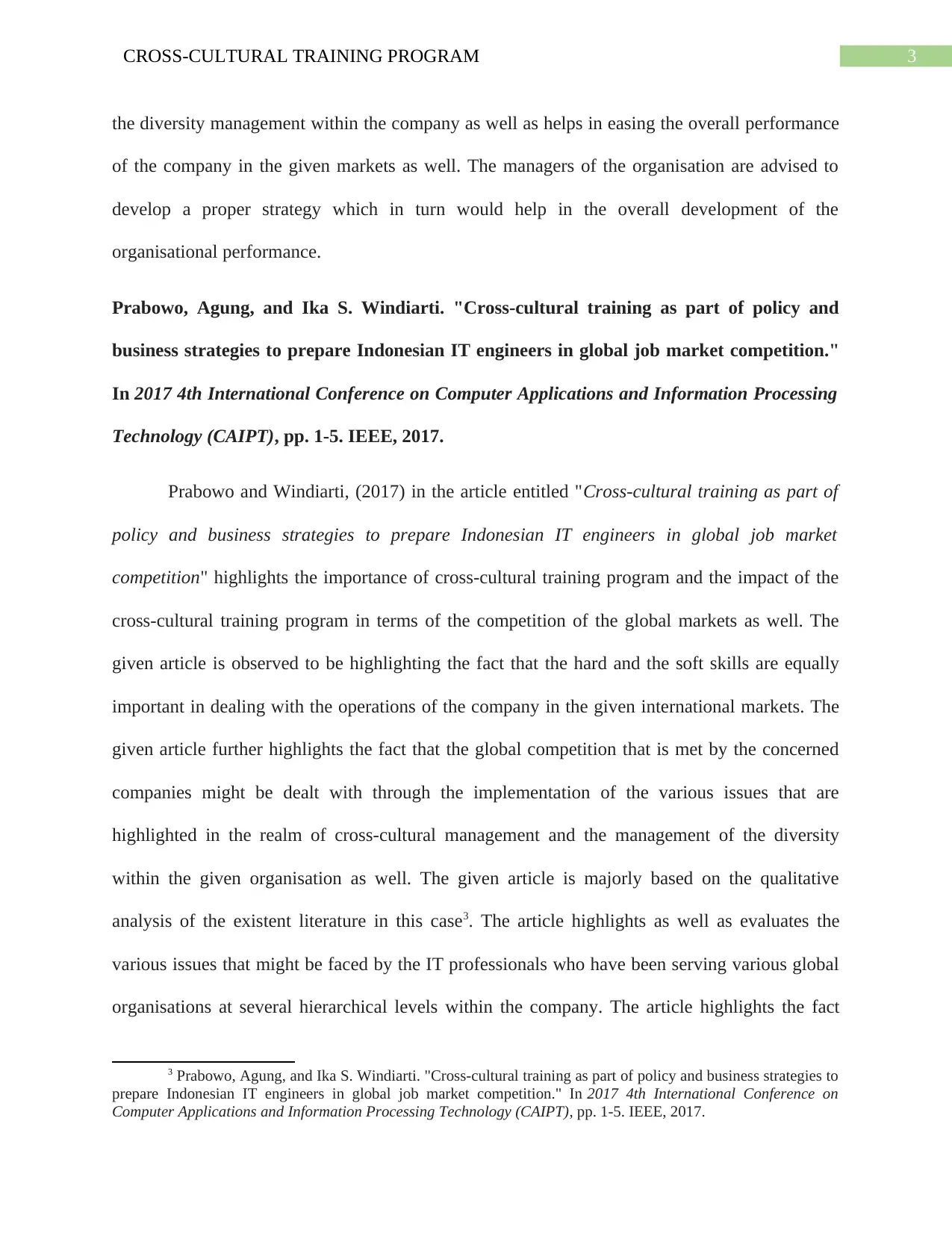
3CROSS-CULTURAL TRAINING PROGRAM
the diversity management within the company as well as helps in easing the overall performance
of the company in the given markets as well. The managers of the organisation are advised to
develop a proper strategy which in turn would help in the overall development of the
organisational performance.
Prabowo, Agung, and Ika S. Windiarti. "Cross-cultural training as part of policy and
business strategies to prepare Indonesian IT engineers in global job market competition."
In 2017 4th International Conference on Computer Applications and Information Processing
Technology (CAIPT), pp. 1-5. IEEE, 2017.
Prabowo and Windiarti, (2017) in the article entitled "Cross-cultural training as part of
policy and business strategies to prepare Indonesian IT engineers in global job market
competition" highlights the importance of cross-cultural training program and the impact of the
cross-cultural training program in terms of the competition of the global markets as well. The
given article is observed to be highlighting the fact that the hard and the soft skills are equally
important in dealing with the operations of the company in the given international markets. The
given article further highlights the fact that the global competition that is met by the concerned
companies might be dealt with through the implementation of the various issues that are
highlighted in the realm of cross-cultural management and the management of the diversity
within the given organisation as well. The given article is majorly based on the qualitative
analysis of the existent literature in this case3. The article highlights as well as evaluates the
various issues that might be faced by the IT professionals who have been serving various global
organisations at several hierarchical levels within the company. The article highlights the fact
3 Prabowo, Agung, and Ika S. Windiarti. "Cross-cultural training as part of policy and business strategies to
prepare Indonesian IT engineers in global job market competition." In 2017 4th International Conference on
Computer Applications and Information Processing Technology (CAIPT), pp. 1-5. IEEE, 2017.
the diversity management within the company as well as helps in easing the overall performance
of the company in the given markets as well. The managers of the organisation are advised to
develop a proper strategy which in turn would help in the overall development of the
organisational performance.
Prabowo, Agung, and Ika S. Windiarti. "Cross-cultural training as part of policy and
business strategies to prepare Indonesian IT engineers in global job market competition."
In 2017 4th International Conference on Computer Applications and Information Processing
Technology (CAIPT), pp. 1-5. IEEE, 2017.
Prabowo and Windiarti, (2017) in the article entitled "Cross-cultural training as part of
policy and business strategies to prepare Indonesian IT engineers in global job market
competition" highlights the importance of cross-cultural training program and the impact of the
cross-cultural training program in terms of the competition of the global markets as well. The
given article is observed to be highlighting the fact that the hard and the soft skills are equally
important in dealing with the operations of the company in the given international markets. The
given article further highlights the fact that the global competition that is met by the concerned
companies might be dealt with through the implementation of the various issues that are
highlighted in the realm of cross-cultural management and the management of the diversity
within the given organisation as well. The given article is majorly based on the qualitative
analysis of the existent literature in this case3. The article highlights as well as evaluates the
various issues that might be faced by the IT professionals who have been serving various global
organisations at several hierarchical levels within the company. The article highlights the fact
3 Prabowo, Agung, and Ika S. Windiarti. "Cross-cultural training as part of policy and business strategies to
prepare Indonesian IT engineers in global job market competition." In 2017 4th International Conference on
Computer Applications and Information Processing Technology (CAIPT), pp. 1-5. IEEE, 2017.
Paraphrase This Document
Need a fresh take? Get an instant paraphrase of this document with our AI Paraphraser
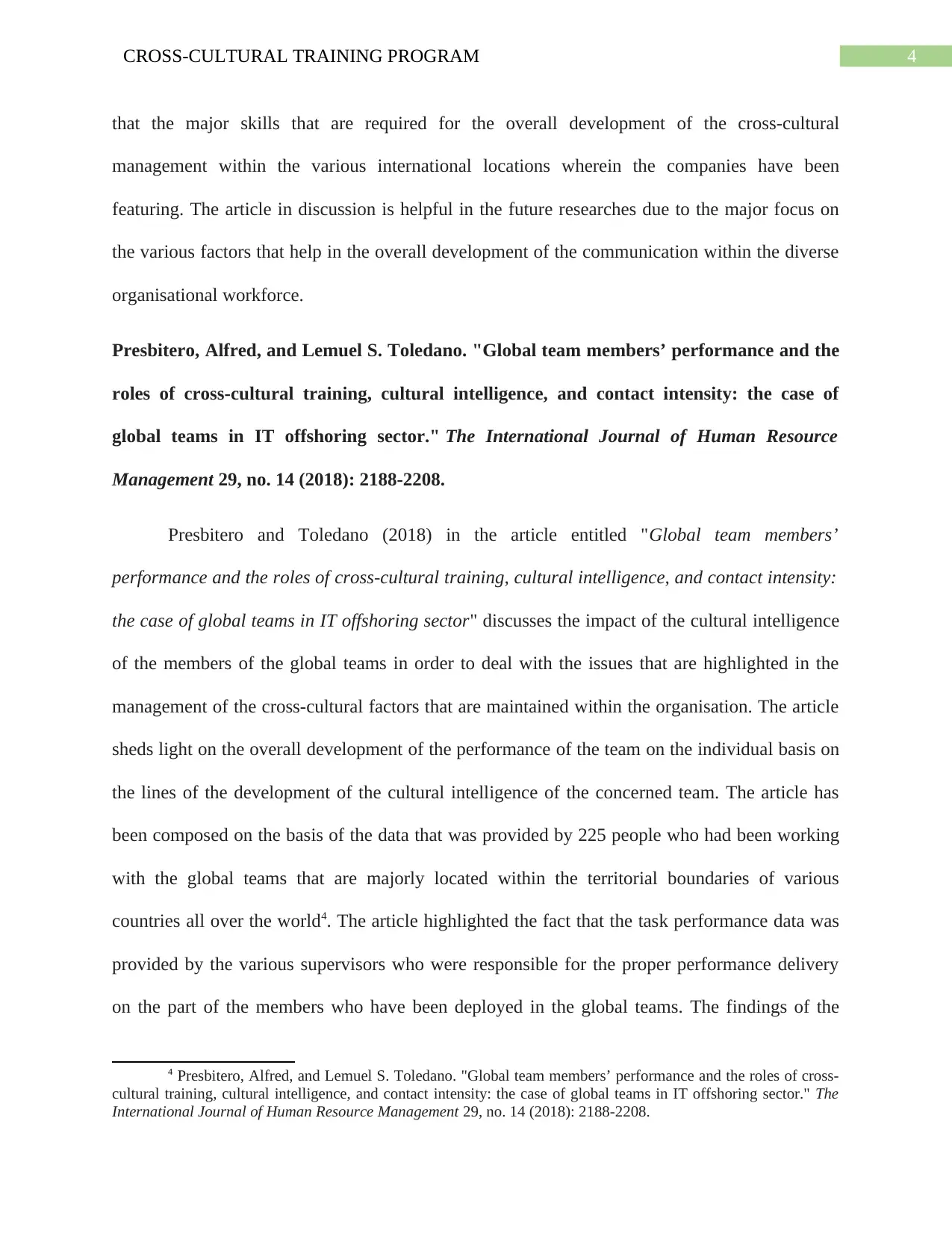
4CROSS-CULTURAL TRAINING PROGRAM
that the major skills that are required for the overall development of the cross-cultural
management within the various international locations wherein the companies have been
featuring. The article in discussion is helpful in the future researches due to the major focus on
the various factors that help in the overall development of the communication within the diverse
organisational workforce.
Presbitero, Alfred, and Lemuel S. Toledano. "Global team members’ performance and the
roles of cross-cultural training, cultural intelligence, and contact intensity: the case of
global teams in IT offshoring sector." The International Journal of Human Resource
Management 29, no. 14 (2018): 2188-2208.
Presbitero and Toledano (2018) in the article entitled "Global team members’
performance and the roles of cross-cultural training, cultural intelligence, and contact intensity:
the case of global teams in IT offshoring sector" discusses the impact of the cultural intelligence
of the members of the global teams in order to deal with the issues that are highlighted in the
management of the cross-cultural factors that are maintained within the organisation. The article
sheds light on the overall development of the performance of the team on the individual basis on
the lines of the development of the cultural intelligence of the concerned team. The article has
been composed on the basis of the data that was provided by 225 people who had been working
with the global teams that are majorly located within the territorial boundaries of various
countries all over the world4. The article highlighted the fact that the task performance data was
provided by the various supervisors who were responsible for the proper performance delivery
on the part of the members who have been deployed in the global teams. The findings of the
4 Presbitero, Alfred, and Lemuel S. Toledano. "Global team members’ performance and the roles of cross-
cultural training, cultural intelligence, and contact intensity: the case of global teams in IT offshoring sector." The
International Journal of Human Resource Management 29, no. 14 (2018): 2188-2208.
that the major skills that are required for the overall development of the cross-cultural
management within the various international locations wherein the companies have been
featuring. The article in discussion is helpful in the future researches due to the major focus on
the various factors that help in the overall development of the communication within the diverse
organisational workforce.
Presbitero, Alfred, and Lemuel S. Toledano. "Global team members’ performance and the
roles of cross-cultural training, cultural intelligence, and contact intensity: the case of
global teams in IT offshoring sector." The International Journal of Human Resource
Management 29, no. 14 (2018): 2188-2208.
Presbitero and Toledano (2018) in the article entitled "Global team members’
performance and the roles of cross-cultural training, cultural intelligence, and contact intensity:
the case of global teams in IT offshoring sector" discusses the impact of the cultural intelligence
of the members of the global teams in order to deal with the issues that are highlighted in the
management of the cross-cultural factors that are maintained within the organisation. The article
sheds light on the overall development of the performance of the team on the individual basis on
the lines of the development of the cultural intelligence of the concerned team. The article has
been composed on the basis of the data that was provided by 225 people who had been working
with the global teams that are majorly located within the territorial boundaries of various
countries all over the world4. The article highlighted the fact that the task performance data was
provided by the various supervisors who were responsible for the proper performance delivery
on the part of the members who have been deployed in the global teams. The findings of the
4 Presbitero, Alfred, and Lemuel S. Toledano. "Global team members’ performance and the roles of cross-
cultural training, cultural intelligence, and contact intensity: the case of global teams in IT offshoring sector." The
International Journal of Human Resource Management 29, no. 14 (2018): 2188-2208.
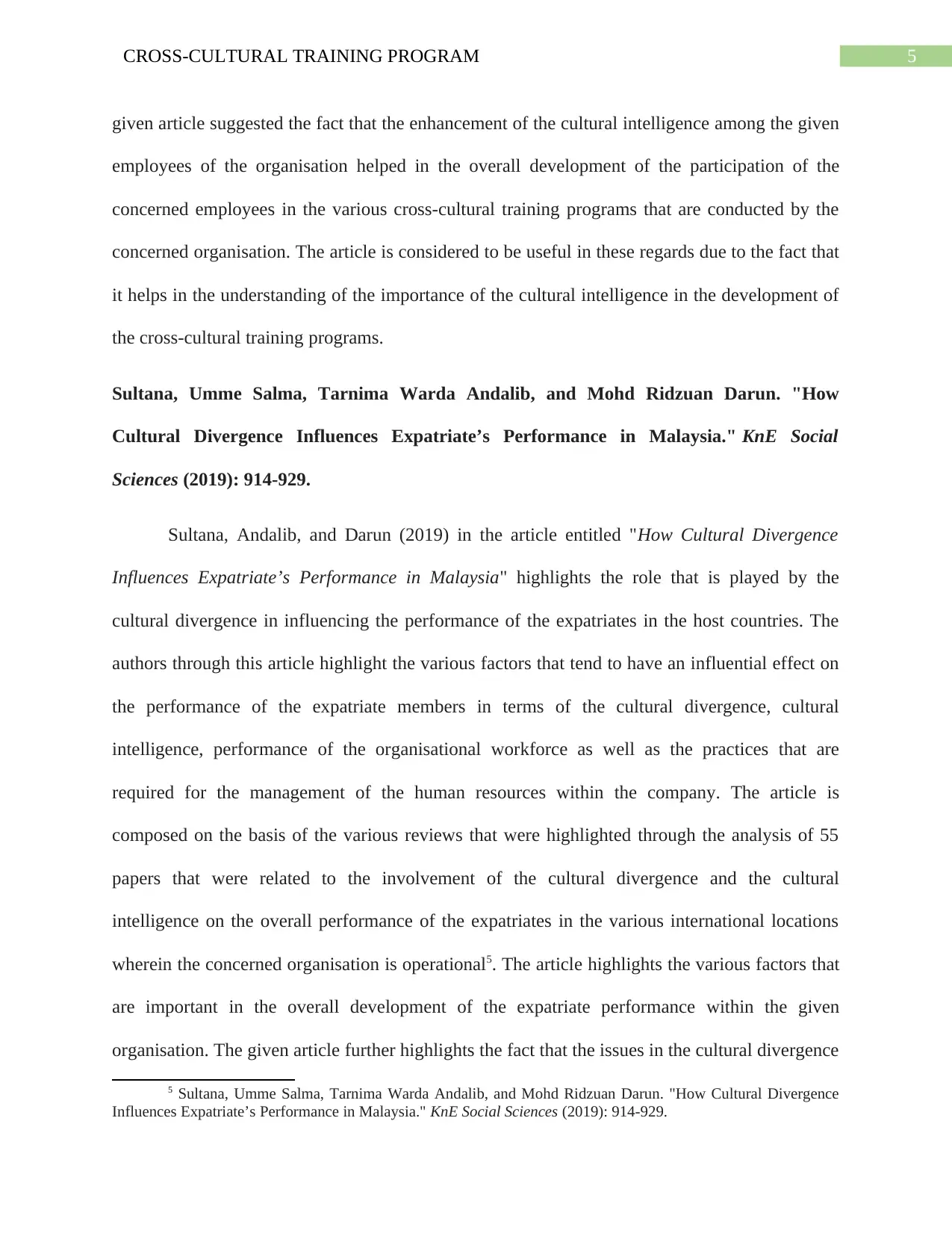
5CROSS-CULTURAL TRAINING PROGRAM
given article suggested the fact that the enhancement of the cultural intelligence among the given
employees of the organisation helped in the overall development of the participation of the
concerned employees in the various cross-cultural training programs that are conducted by the
concerned organisation. The article is considered to be useful in these regards due to the fact that
it helps in the understanding of the importance of the cultural intelligence in the development of
the cross-cultural training programs.
Sultana, Umme Salma, Tarnima Warda Andalib, and Mohd Ridzuan Darun. "How
Cultural Divergence Influences Expatriate’s Performance in Malaysia." KnE Social
Sciences (2019): 914-929.
Sultana, Andalib, and Darun (2019) in the article entitled "How Cultural Divergence
Influences Expatriate’s Performance in Malaysia" highlights the role that is played by the
cultural divergence in influencing the performance of the expatriates in the host countries. The
authors through this article highlight the various factors that tend to have an influential effect on
the performance of the expatriate members in terms of the cultural divergence, cultural
intelligence, performance of the organisational workforce as well as the practices that are
required for the management of the human resources within the company. The article is
composed on the basis of the various reviews that were highlighted through the analysis of 55
papers that were related to the involvement of the cultural divergence and the cultural
intelligence on the overall performance of the expatriates in the various international locations
wherein the concerned organisation is operational5. The article highlights the various factors that
are important in the overall development of the expatriate performance within the given
organisation. The given article further highlights the fact that the issues in the cultural divergence
5 Sultana, Umme Salma, Tarnima Warda Andalib, and Mohd Ridzuan Darun. "How Cultural Divergence
Influences Expatriate’s Performance in Malaysia." KnE Social Sciences (2019): 914-929.
given article suggested the fact that the enhancement of the cultural intelligence among the given
employees of the organisation helped in the overall development of the participation of the
concerned employees in the various cross-cultural training programs that are conducted by the
concerned organisation. The article is considered to be useful in these regards due to the fact that
it helps in the understanding of the importance of the cultural intelligence in the development of
the cross-cultural training programs.
Sultana, Umme Salma, Tarnima Warda Andalib, and Mohd Ridzuan Darun. "How
Cultural Divergence Influences Expatriate’s Performance in Malaysia." KnE Social
Sciences (2019): 914-929.
Sultana, Andalib, and Darun (2019) in the article entitled "How Cultural Divergence
Influences Expatriate’s Performance in Malaysia" highlights the role that is played by the
cultural divergence in influencing the performance of the expatriates in the host countries. The
authors through this article highlight the various factors that tend to have an influential effect on
the performance of the expatriate members in terms of the cultural divergence, cultural
intelligence, performance of the organisational workforce as well as the practices that are
required for the management of the human resources within the company. The article is
composed on the basis of the various reviews that were highlighted through the analysis of 55
papers that were related to the involvement of the cultural divergence and the cultural
intelligence on the overall performance of the expatriates in the various international locations
wherein the concerned organisation is operational5. The article highlights the various factors that
are important in the overall development of the expatriate performance within the given
organisation. The given article further highlights the fact that the issues in the cultural divergence
5 Sultana, Umme Salma, Tarnima Warda Andalib, and Mohd Ridzuan Darun. "How Cultural Divergence
Influences Expatriate’s Performance in Malaysia." KnE Social Sciences (2019): 914-929.
⊘ This is a preview!⊘
Do you want full access?
Subscribe today to unlock all pages.

Trusted by 1+ million students worldwide
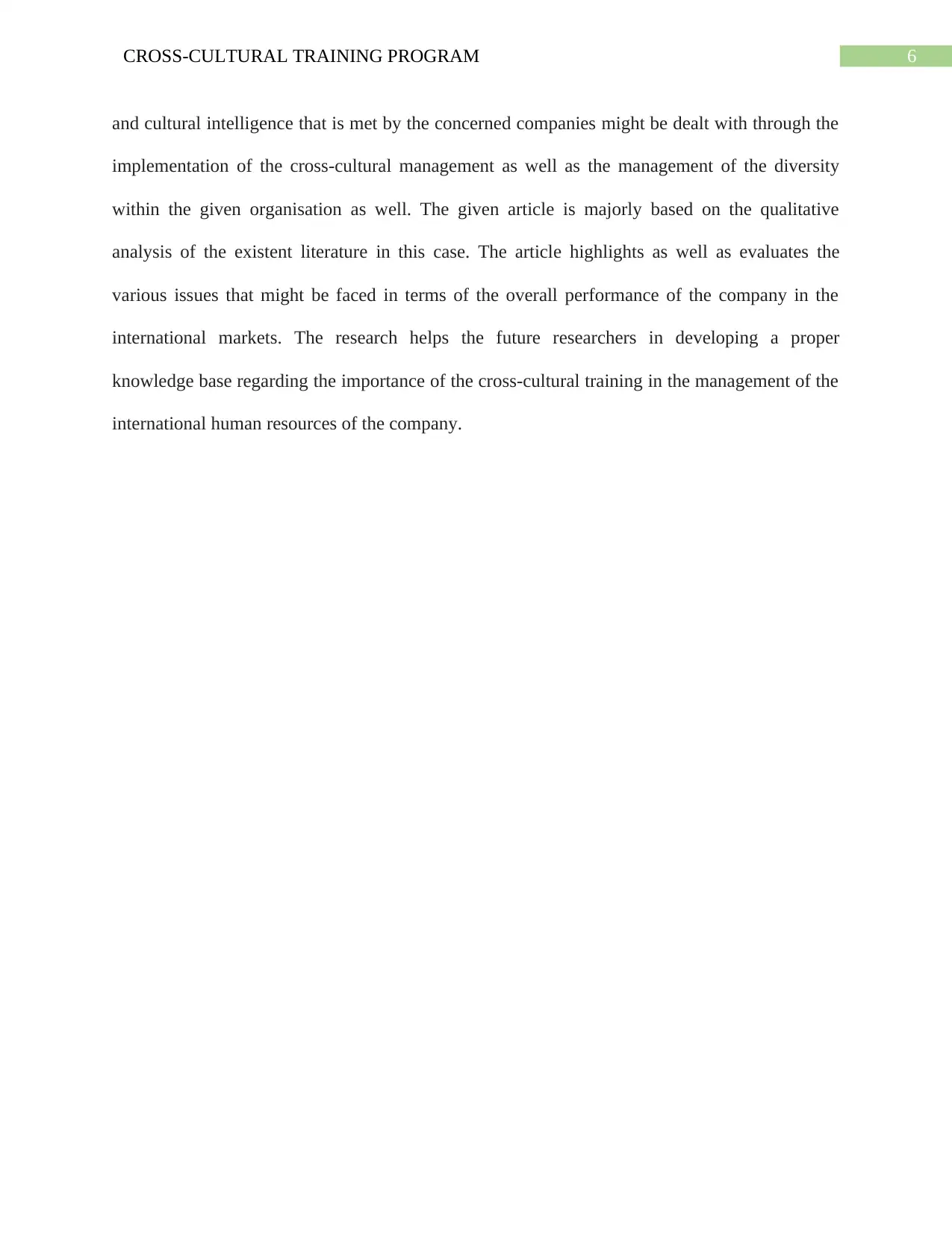
6CROSS-CULTURAL TRAINING PROGRAM
and cultural intelligence that is met by the concerned companies might be dealt with through the
implementation of the cross-cultural management as well as the management of the diversity
within the given organisation as well. The given article is majorly based on the qualitative
analysis of the existent literature in this case. The article highlights as well as evaluates the
various issues that might be faced in terms of the overall performance of the company in the
international markets. The research helps the future researchers in developing a proper
knowledge base regarding the importance of the cross-cultural training in the management of the
international human resources of the company.
and cultural intelligence that is met by the concerned companies might be dealt with through the
implementation of the cross-cultural management as well as the management of the diversity
within the given organisation as well. The given article is majorly based on the qualitative
analysis of the existent literature in this case. The article highlights as well as evaluates the
various issues that might be faced in terms of the overall performance of the company in the
international markets. The research helps the future researchers in developing a proper
knowledge base regarding the importance of the cross-cultural training in the management of the
international human resources of the company.
Paraphrase This Document
Need a fresh take? Get an instant paraphrase of this document with our AI Paraphraser
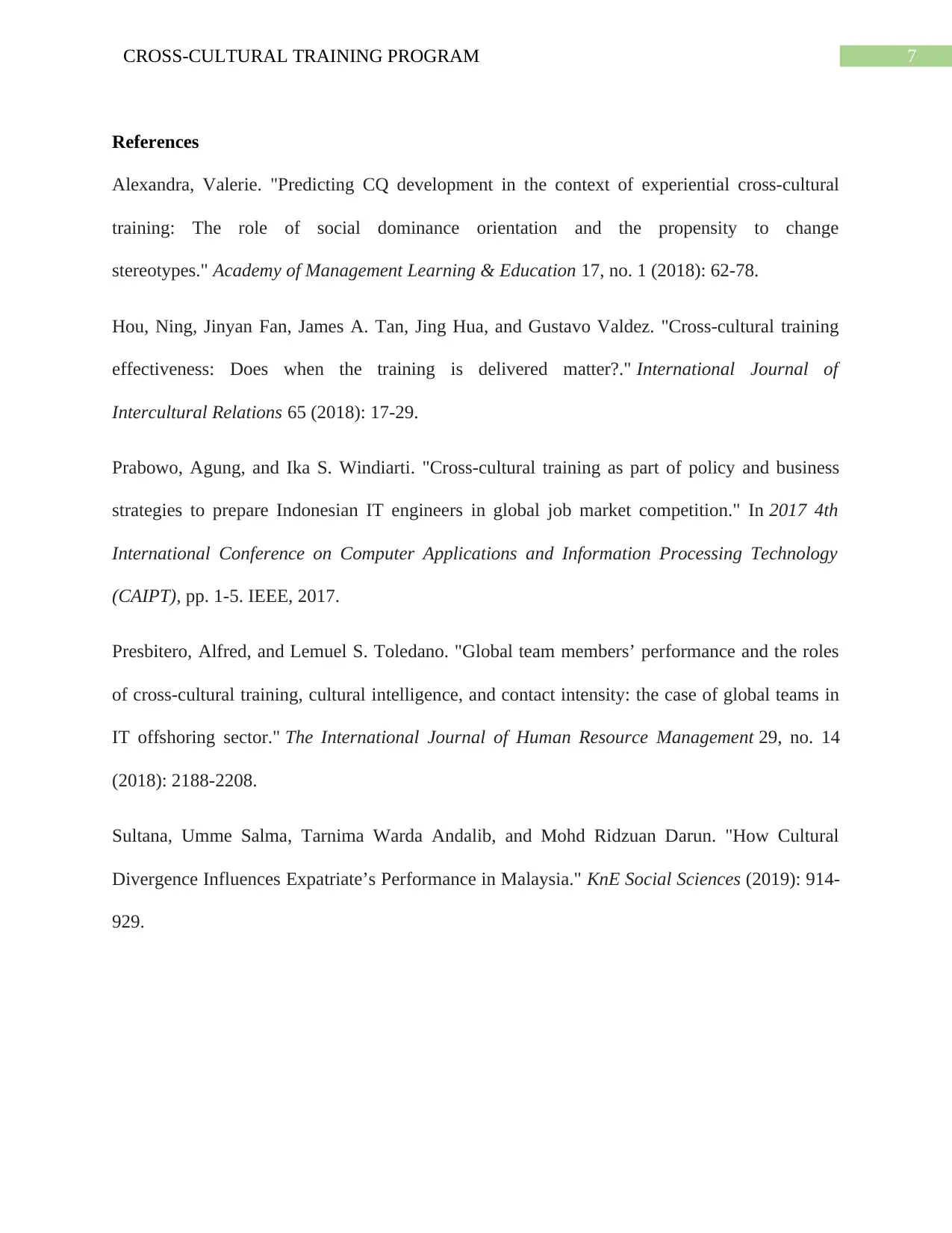
7CROSS-CULTURAL TRAINING PROGRAM
References
Alexandra, Valerie. "Predicting CQ development in the context of experiential cross-cultural
training: The role of social dominance orientation and the propensity to change
stereotypes." Academy of Management Learning & Education 17, no. 1 (2018): 62-78.
Hou, Ning, Jinyan Fan, James A. Tan, Jing Hua, and Gustavo Valdez. "Cross-cultural training
effectiveness: Does when the training is delivered matter?." International Journal of
Intercultural Relations 65 (2018): 17-29.
Prabowo, Agung, and Ika S. Windiarti. "Cross-cultural training as part of policy and business
strategies to prepare Indonesian IT engineers in global job market competition." In 2017 4th
International Conference on Computer Applications and Information Processing Technology
(CAIPT), pp. 1-5. IEEE, 2017.
Presbitero, Alfred, and Lemuel S. Toledano. "Global team members’ performance and the roles
of cross-cultural training, cultural intelligence, and contact intensity: the case of global teams in
IT offshoring sector." The International Journal of Human Resource Management 29, no. 14
(2018): 2188-2208.
Sultana, Umme Salma, Tarnima Warda Andalib, and Mohd Ridzuan Darun. "How Cultural
Divergence Influences Expatriate’s Performance in Malaysia." KnE Social Sciences (2019): 914-
929.
References
Alexandra, Valerie. "Predicting CQ development in the context of experiential cross-cultural
training: The role of social dominance orientation and the propensity to change
stereotypes." Academy of Management Learning & Education 17, no. 1 (2018): 62-78.
Hou, Ning, Jinyan Fan, James A. Tan, Jing Hua, and Gustavo Valdez. "Cross-cultural training
effectiveness: Does when the training is delivered matter?." International Journal of
Intercultural Relations 65 (2018): 17-29.
Prabowo, Agung, and Ika S. Windiarti. "Cross-cultural training as part of policy and business
strategies to prepare Indonesian IT engineers in global job market competition." In 2017 4th
International Conference on Computer Applications and Information Processing Technology
(CAIPT), pp. 1-5. IEEE, 2017.
Presbitero, Alfred, and Lemuel S. Toledano. "Global team members’ performance and the roles
of cross-cultural training, cultural intelligence, and contact intensity: the case of global teams in
IT offshoring sector." The International Journal of Human Resource Management 29, no. 14
(2018): 2188-2208.
Sultana, Umme Salma, Tarnima Warda Andalib, and Mohd Ridzuan Darun. "How Cultural
Divergence Influences Expatriate’s Performance in Malaysia." KnE Social Sciences (2019): 914-
929.
1 out of 8
Your All-in-One AI-Powered Toolkit for Academic Success.
+13062052269
info@desklib.com
Available 24*7 on WhatsApp / Email
![[object Object]](/_next/static/media/star-bottom.7253800d.svg)
Unlock your academic potential
Copyright © 2020–2026 A2Z Services. All Rights Reserved. Developed and managed by ZUCOL.